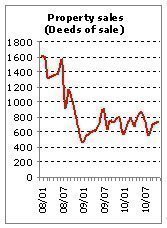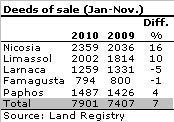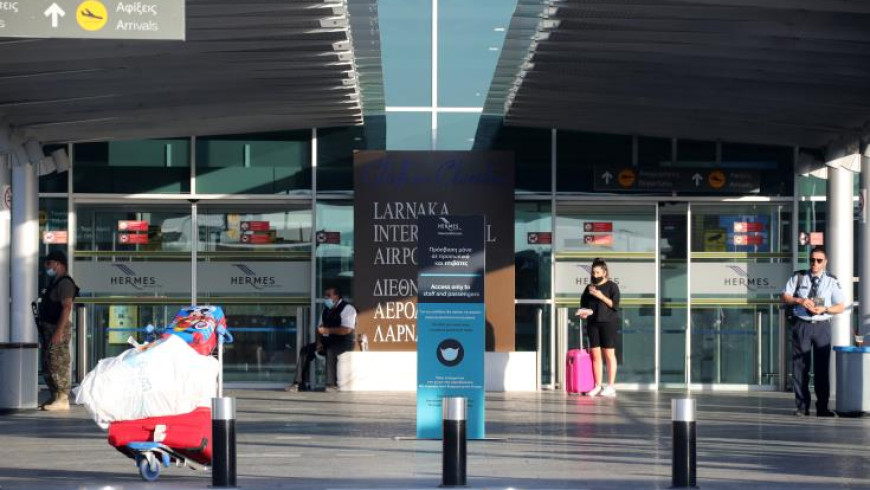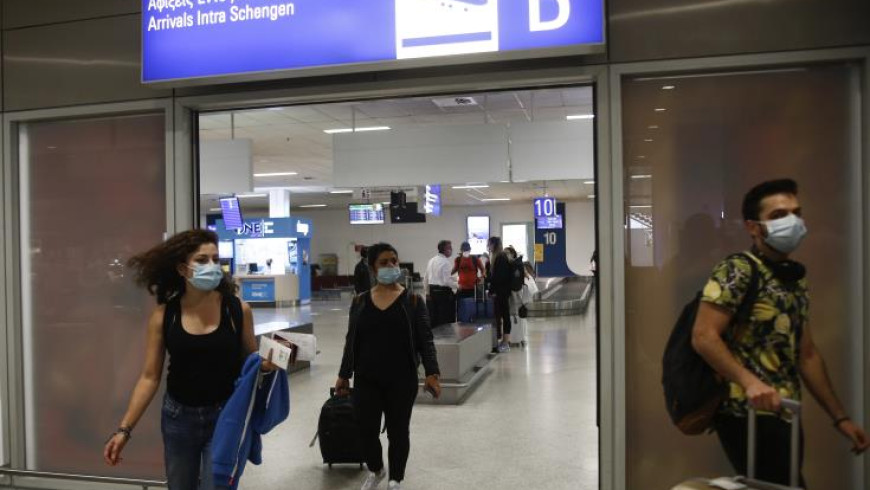
Property sales in Cyprus fell for the fifth consecutive month in November, signaling the difficulties that the market will face in 2011. The market is kept alive by Nicosia and Limassol but the valuators believe that the big urban centers will not remain unaffected in 2011.
The Land Registry figures released yesterday reflect the difficult year for the sector and the sales are lower for one month more, despite last year’s low basis.
The annual decline in November reached 6% against a decline of 1% in October. According to the figures, the deeds of sale for the month stood at 741 against 714 in October 2010 and 792 in November 2009.
 The summer house market in the seaside areas is still the weakest link.
The summer house market in the seaside areas is still the weakest link.
It is worth noting that Larnaca and free Famagusta are severely hit by the market conditions.
Indeed, the annual drop in Larnaca reached 32% and sales fell to 91 from 134.
In Famagusta, sales declined 25% to 69 from 92 in November 2009.
In Paphos, the condition has stabilized to last year’s low level and the drop stood at 3% in November.
Things are different in the big urban centers, which do not depend on the tourist houses.
In Nicosia, which concentrates a large part of the total demand, sales rose 3% to 228 from 221. Limassol saw its sales increasing 6% too.
The November decline restricted total sales for January – November to 7% and it is estimated that the year will end higher than last year’s basis.
On a national basis, sales amount to 7901 from 7407 last year.
 The general picture for January – November is similar to that of November, with the two biggest cities recording an impressive increase and the other recording lower or negative growth. In the first eleven months of 2010, property sales in Nicosia and Limassol surged 16% and 10% respectively, while those in Paphos rose 4%.
The general picture for January – November is similar to that of November, with the two biggest cities recording an impressive increase and the other recording lower or negative growth. In the first eleven months of 2010, property sales in Nicosia and Limassol surged 16% and 10% respectively, while those in Paphos rose 4%.
Sales in Larnaca for the same period fell 5% and in Famagusta dropped 1%.
The market circles expect that this downward trend will continue.
According to property valuator, Polys Kourousides, stagnation will continue and the year will close with a slight increase mostly due to last year’s low basis.
“Things in 2011 will be the same as those in 2010. Nicosia and Limassol, which were kept high in 2010, might be affected more”, he concluded.
The Land Registry figures released yesterday reflect the difficult year for the sector and the sales are lower for one month more, despite last year’s low basis.
The annual decline in November reached 6% against a decline of 1% in October. According to the figures, the deeds of sale for the month stood at 741 against 714 in October 2010 and 792 in November 2009.
 The summer house market in the seaside areas is still the weakest link.
The summer house market in the seaside areas is still the weakest link. It is worth noting that Larnaca and free Famagusta are severely hit by the market conditions.
Indeed, the annual drop in Larnaca reached 32% and sales fell to 91 from 134.
In Famagusta, sales declined 25% to 69 from 92 in November 2009.
In Paphos, the condition has stabilized to last year’s low level and the drop stood at 3% in November.
Things are different in the big urban centers, which do not depend on the tourist houses.
In Nicosia, which concentrates a large part of the total demand, sales rose 3% to 228 from 221. Limassol saw its sales increasing 6% too.
The November decline restricted total sales for January – November to 7% and it is estimated that the year will end higher than last year’s basis.
On a national basis, sales amount to 7901 from 7407 last year.
 The general picture for January – November is similar to that of November, with the two biggest cities recording an impressive increase and the other recording lower or negative growth. In the first eleven months of 2010, property sales in Nicosia and Limassol surged 16% and 10% respectively, while those in Paphos rose 4%.
The general picture for January – November is similar to that of November, with the two biggest cities recording an impressive increase and the other recording lower or negative growth. In the first eleven months of 2010, property sales in Nicosia and Limassol surged 16% and 10% respectively, while those in Paphos rose 4%. Sales in Larnaca for the same period fell 5% and in Famagusta dropped 1%.
The market circles expect that this downward trend will continue.
According to property valuator, Polys Kourousides, stagnation will continue and the year will close with a slight increase mostly due to last year’s low basis.
“Things in 2011 will be the same as those in 2010. Nicosia and Limassol, which were kept high in 2010, might be affected more”, he concluded.












 3287.99
3287.99 1275.09
1275.09
